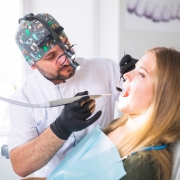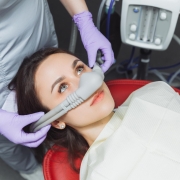When you have a healthy mouth, you have even bigger reasons to smile at the people around you. Teeth cleaning at a Jacksonville dentist is one of the easiest ways to make sure you retain many reasons to smile for the years to come. At the office of Dr. Matt Henry, we offer quick and easy teeth cleaning appointments to keep you proactive about taking good care of your oral health.
What Happens During a Teeth Cleaning Visit?
An oral hygiene visit with a Jacksonville dentist is one of the most routine processes in dental care. Usually, the process is done by a trained dental hygienist who specifically handles hygiene appointments. The hygienist will:
- Use a solution to soften areas of plaque or tartar on your teeth
- Use tiny tools to scrape those formations off of your teeth
- Work on each tooth individually to remove debris
- Use a small water sprayer to slough away the debris as they work
While the hygienist works, they will use a suction device to pull the solution and any debris out of your mouth so it does not get swallowed. You will feel the hygienist scraping all areas of your teeth, including the backs of and in between your teeth where tartar is most likely to form. Once the cleaning process is complete, the hygienist may also use a small tool to polish the enamel of each of your teeth, which can leave your smile even cleaner.
A Look at the Importance of Regular Teeth Cleanings in Jacksonville
The link between periodontal (gum) disease and tooth loss is highly associated with how many preventive visits you make to your dentist. Teeth cleaning at the dentist is a major component of that preventive care. While you may do all you can to keep your teeth clean at home with regular brushing and flossing, you simply can’t see or get to all surfaces with this basic oral care.
Over time, tartar collects between teeth and at the gumline. This tartar can harden and form a bacteria-trapping formation on your teeth that puts you at risk of decay and gum disease. These deposits are already in areas where your floss or brush may not reach, so the development of problems can occur pretty quickly. As an adage, lack of professional hygiene appointments with your dentist can mean you are more likely to have problems with bad breath due to bacteria hanging out in your mouth.
Common Patient Questions About Teeth Cleaning
Does getting your teeth cleaned hurt?
Teeth cleaning should never outright hurt, but you may have some tender points or sensitive areas of your mouth that can cause minimal discomfort. If the process is too uncomfortable for a patient to handle, which is extremely rare, the dentist can use a localized anesthetic or take measures to keep you comfortable. After leaving the office, some patients do have slightly sore gums and possibly a bit of bleeding from the gums. This is perfectly normal because the scaling process is done beneath the gumline.
How often should you have your teeth cleaned?
The general recommendation by the American Dental Association is to have your teeth cleaned by a Jacksonville dentist about once a year. However, some patients who are more at risk of dental health issues may benefit from more frequent cleanings. For example, a patient with a family history of gum disease may need a cleaning every six months to keep their own risks at bay.
Will your teeth be whiter after they’re cleaned?
You may indeed notice your teeth look whiter after basic cleaning. The techniques used can break up some surface stains on your enamel. Further, small bits of discolored plaque and tartar will no longer be visible. Therefore, you may see a brighter smile when you leave the office. However, if you are looking for more effective teeth whitening in Jacksonville, we do offer professional whitening in our office as well.
How long does it take to get your teeth cleaned?
Teeth cleaning appointments do not generally take too long to complete. Most patients are in and out of the office within 30 minutes. However, the actual duration of the cleaning can depend on how much plaque and tartar you have to remove or even how long it has been since your last appointment. The goal is to always do a thorough clean, even if that process takes a little longer than usual to complete.
Why are your teeth sensitive after teeth cleaning at the dentist?
Dental sensitivity for a few hours after cleaning is perfectly normal. During the cleaning process, the hygienist will remove plaque and tartar that may have been hardened on your enamel for a while. With these damaging compounds removed, you may find a bit of added sensitivity to cold or heat. However, the sensation should quickly subside.
Do children also need their teeth cleaned?
Children can actually be more prone to decay than adults because they don’t always do thorough brushing and flossing at home. Therefore, children should have their teeth cleaned by a dentist in Jacksonville periodically.
Keep Your Dental Hygiene in Check with a Jacksonville Dentist
Dental hygiene appointments to get your teeth adequately cleaned can be one of the most important things you ever do for your long-term oral health. The process is simple, not painful, and quick, but can mean keeping a healthy smile for the years to come. If you are looking for a dentist in Jacksonville to help you get the most from your dental hygiene appointments, reach out to us at the office of Dr. Matt Henry.











